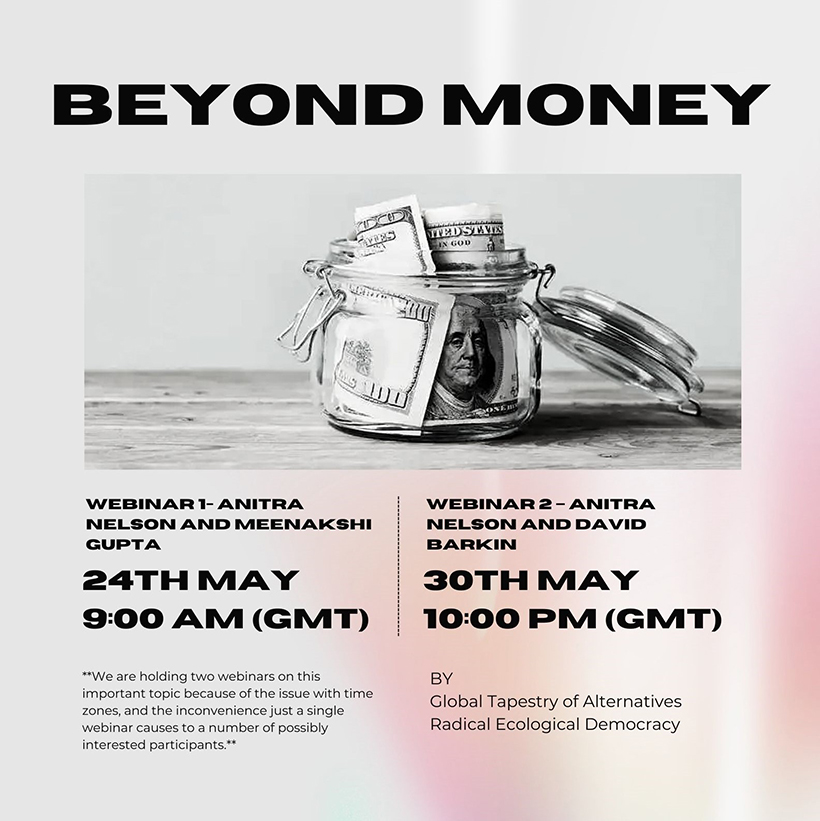Is it possible to imagine a world without money?
Anitra Nelson, in her recent book, “Beyond Money: A Post Capitalist Strategy”, not only envisions that world but also gives it concrete shape, laying the ideological foundation of a post-money society based on real, non-monetary, social and ecological values that define a new order committed to fulfilling people’s basic needs. If money is the lynchpin of the contemporary capitalist order then it is imperative that an alternative to that world is imagined and crafted outside the constraints of money.
In a two part series of webinars, Anitra Nelson is joined by David Barkin, a Mexican economist, and Meenakshi Gupta, an Indian social entrepreneur to discuss how money could be replaced as the organizing principle of society allowing the fabrication of a world without socio-economic inequality and crippling environmental stresses.
Panelists:
Anitra Nelson
Activist scholar Anitra Nelson is Honorary Principal Fellow at Melbourne Sustainable Society Institute, University of Melbourne (Australia), co-author of Exploring Degrowth: A Critical Guide (2020), co-editor of Life Without Money: Building Fair and Sustainable Economies (2011) and author of Small is Necessary: Shared Living on a Shared Planet (2018) and Marx’s Concept of Money: The God of Commodities (1999/2014, Routledge). Site: https://anitranelson.info/beyond-money/
David Barkin
David Barkin is Professor of Economics at the Xochimilco Campus of the Universidad Autónoma Metropolitana in México City. He is a member of the Mexican Academy of Sciences and of the National Research Council. Much of Dr. Barkin’s work is conducted in collaboration with local communities and regional citizens’ groups. His most recent books include: Wealth, Poverty and Sustainable Development and Innovaciones Mexicanas en el Manejo del Agua. (Mexican Innovations in Water Management).
Meenakshi Gupta
Meenakshi Gupta is a social entrepreneur and cofounder of Goonj, a New Delhi based Indian NGO, which channelizes urban discarded material as a tool to address crucial gaps in rural infrastructure, water, environment, livelihood, education, health, disaster relief and rehabilitation. Goonj’s model of development proposes an inclusive alternative economy where everyone is an equal stakeholder in the process. Site: http://www.goonj.org
Sessions
Webinar 1 – Anitra Nelson and Meenakshi Gupta
-
Date: 24th of May
-
Time: 9.00 AM UTC
-
Sydney – 7 P.M.
-
New Delhi – 2:30 P.M.
-
London – 10 A.M.
-
Johannesburg – 11 A.M.
-
Webinar 2 – Anitra Nelson and David Barkin
-
Date: 30th of May
-
Time: 10.00 PM UTC
-
Washington D.C. – 6 P.M.
-
Mexico City – 5 P.M.
-
San Francisco – 3 P.M.
-
Buenos Aires – 7 P.M.
-
Sydney – 8 A.M. (31st of May)
-
We are holding two webinars on this important topic because of the issue with time zones, and the inconvenience just a single webinar causes to a number of possibly interested participants. This webinar is aimed at an audience in South America, Central America, North America and Australia. We also have Spanish<>English simultaneous translation available for the webinar on 30th May.

To access other articles published on this same subject, click here.












